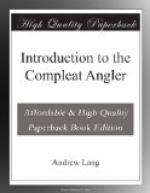Walton brought out a second edition in 1655. He rewrote the book, adding more than a third, suppressing Viator, and introducing Venator. New plates were added, and, after the manner of the time, commendatory verses. A third edition appeared in 1661, a fourth (published by Simon Gape, not by Marriott) came out in 1664, a fifth in 1668 (counting Gape’s of 1664 as a new edition), and in 1676, the work, with treatises by Venables and Charles Cotton, was given to the world as The Universal Angler. Five editions in twelve years is not bad evidence of Walton’s popularity. But times now altered. Walton is really an Elizabethan: he has the quaint freshness, the apparently artless music of language of the great age. He is a friend of ‘country contents’: no lover of the town, no keen student of urban ways and mundane men. A new taste, modelled on that of the wits of Louis XIV., had come in: we are in the period of Dryden, and approaching that of Pope.
There was no new edition of Walton till Moses Browne (by Johnson’s desire) published him, with ‘improvements,’ in 1750. Then came Hawkins’s edition in 1760. Johnson said of Hawkins, ’Why, ma’am, I believe him to be an honest man at the bottom; but, to be sure, he is penurious, and he is mean, and it must be owned he has a degree of brutality, and a tendency to savageness, that cannot easily be defended.’
This was hardly the editor for Izaak! However, Hawkins, probably by aid of Oldys the antiquary (as Mr. Marston shows), laid a good foundation for a biography of Walton. Errors he made, but Sir Harris Nicolas has corrected them. Johnson himself reckoned Walton’s Lives as ’one of his most favourite books.’ He preferred the life of Donne, and justly complained that Walton’s story of Donne’s vision of his absent wife had been left out of a modern edition. He explained Walton’s friendship with persons of higher rank by his being ‘a great panegyrist.’
The eighteenth century, we see, came back to Walton, as the nineteenth has done. He was precisely the author to suit Charles Lamb. He was reprinted again and again, and illustrated by Stoddart and others. Among his best editors are Major (1839), ‘Ephemera’ (1853), Nicolas (1836, 1860), and Mr. Marston (1888).




